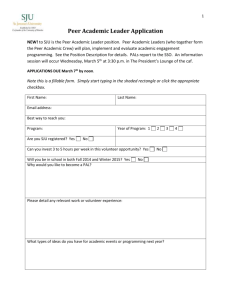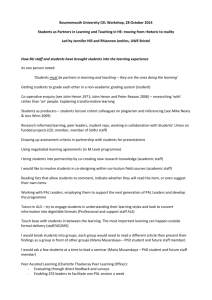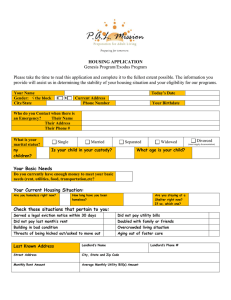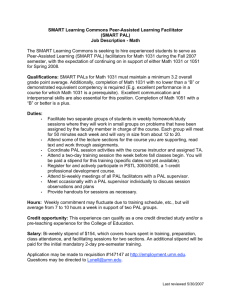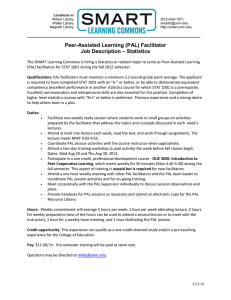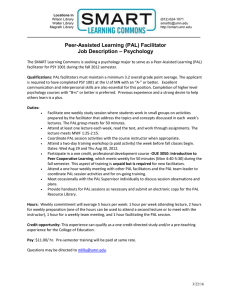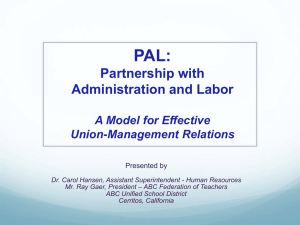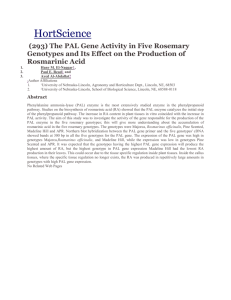Academic Support
advertisement
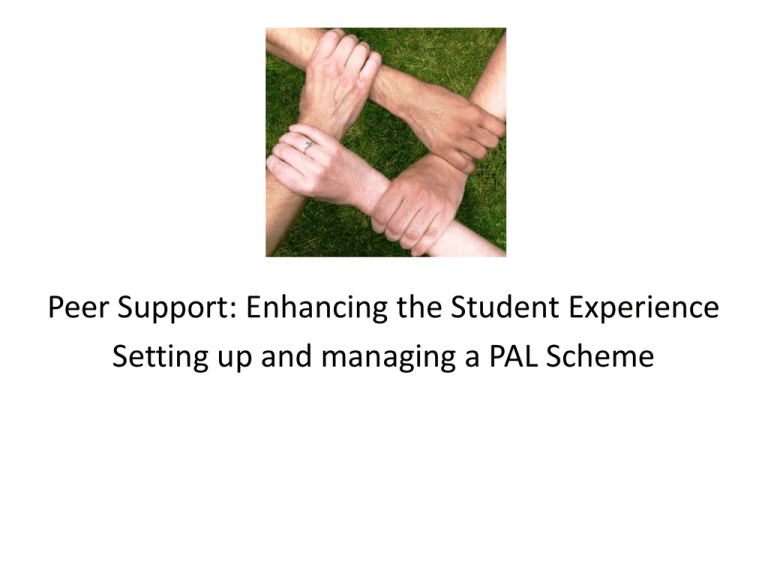
Peer Support: Enhancing the Student Experience Setting up and managing a PAL Scheme Steps to Success •Examine the Projects Aims, Objectives and Purpose •Initially look at the identified need of the students, leaders, staff and schools •Consult with the relevant parties on how we deliver on these goals •Identify key features of success and areas of development •Ensure a comprehensive training package: Covering key concepts, behaviours and guidelines •Role out, monitor and evaluate Pilot Projects •Make recommendations for future developments Key Elements • • • • • • Student-led and discipline-owned Academic responsibility and administrative support Voluntary and non-remedial Supportive and non-threatening Diverse and reflective group of Peer Supporters Formal Application & Interview process with compulsory training • Continuous support, supervision and development • Robust monitoring and evaluating mechanisms Common Challenges • Logistics: Timetabling & room bookings • Ensuring each Scheme has appropriate academic and administrative support • Running appropriate and comprehensive training as the Schemes grow • Advertisement and marketing • Creating and maintaining a robust and organised management system • Ensuring a small, local budget is allocated to each Scheme • Generating initial and sustained student attendance • Maintaining the motivation of Volunteers Aligned to Strategic Goals • • • • • • • • Academic Performance Student Experience Feedback Transition Employability Personalised and Autonomous Learning Student Engagement Global connections Purpose of PALS Session • Support the student learning experience by encouraging collaborative, exploratory discussion in a safe environment • Provide an additional mechanism for communication and feedback between teaching staff and students • Improve academic performance and achievement • Encourage a student centred approach to learning through greater peer interaction • Enhance the learning experience and Personal Development of PALS Leaders PALS Approach • • • • • • • • • • • Trained Student Leaders facilitate study sessions in pairs Quality assured comprehensive, interactive, practical training Small group collaborative rather than competitive learning Regular, timetabled, voluntary and confidential Safe place to admit not understanding Content is based on course materials Students set the session agenda PALS Leaders are engaged in sharing their experience PAL encourages fun interaction between year groups PAL benefits all students regardless of academic performance Students compare notes, clarify what they read and hear, analyse, criticise, question and seek verification of ideas Break the Dependency Cycle Tell them Tutor Students Break the Dependency Cycle Get them to tell each other Students SI leader Training Leaders • Initial facilitator training; Comprehensive, interactive and practical – Experiential – Managing group dynamics – Developing tools and techniques • Areas we cover – PAL background – Facilitation – what and how? – Communication – Managing group dynamics – Questioning and redirecting – Learning Theory (not lots!) – ‘Doing PAL’ – First session preparation – Ongoing debriefs and supervision Co-ordination Roles &Functions • • • • • • • • • • • • Supervisor: Leadership in developing and implementing PAL Project Guidance in selection of courses/modules Training and supporting Leaders development of session activity Staff support Motivating PAL Leaders, recognition & reward Quality Assurance Academic Support Communication of course/unit content/structure Responding to feedback Recommending and promoting PALS Administrative support Logistics Marketing General Support The International Network • International Center for SI/PAL – University of Missouri-Kansas City (UMKC) • National Centers for SI/PAL – – – – – – United Kingdom (The University of Manchester) Australia Sweden South Africa Mexico Canada Budget Considerations • • • • • • • What funds/grants are available? Will you pay your Leaders? Do you need to buy out staff time? Do you have to pay for rooms? What will be the training costs? What resources will you/leaders need? What will be the ongoing costs? Evaluating PALS • • • • • • • Quality assurance Stage 1: Why are you introducing? Stage 2: How or what to measure? Stage 3: Motivating those collecting the data Stage 4: How to collect Stage 5: Collating results Stage 6: Analysis - consultation/ implementation support - training (staff/students) - observations - debriefs/ongoing support - Evaluation
